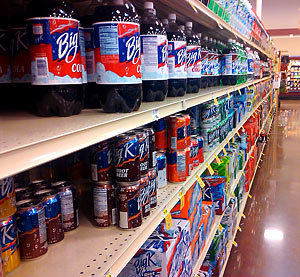It’s no secret Americans eat (and more often, drink) too much sugar: about 20 teaspoons worth per day, on average. By contrast, recommendations are that women eat no more than about 6 teaspoons worth, 9 teaspoons for men.
Another truth – despite the best efforts of Big Food companies to distract from it — is that overdoing sugar is making us sick. The likes of Robert Lustig, MD, a children’s endocrinologist, along with other expert docs and public health researchers, have been filling our gaps in understanding how the decades-long rise in our intake of sugary processed foods, including soda, helped create a nation struggling with an epidemic of obesity, diabetes and diet-related disease.
A food system where sugary foods, whether in a school hallway, street corner or supermarket shelf, usually are among the easiest to find and cheapest to buy, is broken. And costing us all dearly. Direct costs of treating obesity alone are estimated at $147 billion to $210 billion annually, and rising.
Against this backdrop, two developments this week caused me to sigh, and a then think to myself: “It’s about time.”
Yesterday, Mark Bittman wrote about the latest brave move by Congresswoman Rosa DeLauro, a longtime champion for healthier food. Unswayed by her peers in the U.S. House, Rep. DeLauro introduced a piece of legislation called the SWEET Act, which would put in place a quite modest national tax on added sugar amounting to a penny per each teaspoon of the white stuff now added to foods and drinks. That amounts to roughly a dime per can of sugary soda.
By making sugary drinks a wee bit more expensive, the SWEET ACT would be a worthy start in trying to work upstream, where it makes the most sense, to create a healthier food system. DeLauro’s tax doesn’t supplant the role parents can play in helping kids make better choices. It helps them.
Why pay hundreds of billions downstream trying to keep people with diabetes and heart disease from suffering premature death, in other words, when a tax could reduce their sugary soda intake as kids, and reduce the odds of developing obesity-related disease in the first place?
The week’s other major development was a letter, signed by more than 300 physicians, nurses and other health professionals, including Dr. Lustig (and half of them members of Healthy Food Action), to the Food and Drug Administration. The letter strongly supports FDA’s proposal to put an “added sugar” line on the Nutrition Facts label of all processed foods and beverages. HFA and UCS worked closely to raise awareness among health professionals and provide a platform for action.
FDA’s proposal would, for the first time, take the cloak off added sugars. Parents and other consumers would no longer be in the dark; in effect, they would finally be on a more level playing field with processed food companies, which know exactly how much sugar, salt, dyes and other additives are in their products.
Now that’s something sweet I can’t wait to try.

